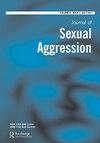An investigation of the relationship between female rape myths, child sexual abuse myths and personality disorders
IF 1.5
4区 社会学
Q2 CRIMINOLOGY & PENOLOGY
引用次数: 0
Abstract
ABSTRACTGiven high prevalence rates internationally for female rape and CSA and a gap in the literature regarding personality characteristics of those more likely to endorse these myths, this research sought to examine female rape myths versus child sexual abuse (CSA) myth acceptances as a function of the participants’ maladaptive personality traits and sexual trauma history. 469 adults (61.4% female, 36.5% male, M age range 35–44 years old) participated, endorsing significantly higher rates of acceptance of female rape myths than CSA myths. Sexual trauma history was unrelated to either myth. Higher scores on Antisocial, Narcissistic and Sadistic Personality Disorder scales were significantly correlated with higher rates of acceptance of both myths. Multiple regression analyses determined that higher scores on Narcissistic and Sadistic personality scales uniquely predicted both higher CSA and female rape myth acceptance. The results offer implications for more effective communications to combat false beliefs about CSA and sexual assault.PRACTICE IMPACT STATEMENT The results may have implications for interventions targeting false beliefs about CSA and sexual assault. Our research focuses on personality disorder traits, leading to possible implications for individuals with these traits or disorders, as they are diagnoseable and therefore can be treatable. Interventions targeting these myths generally may not be as effective for someone with these personality disorders, so this research suggests perhaps modified protocols can be created to help destigmatise CSA and rape survivors in these populations.KEYWORDS: Rape mythschild sexual abuse mythspersonality disordersCoolidge axis II inventoryCSA myth scaleIllinois rape myth acceptance scale Disclosure statementNo potential conflict of interest was reported by the author(s).女性强奸神话、儿童性虐待神话与人格障碍的关系研究
摘要考虑到国际上女性强奸和儿童性侵的高患病率,以及文献中关于更可能认同这些神话的人格特征的空白,本研究试图检验女性强奸神话与儿童性虐待神话的接受程度是参与者不适应人格特征和性创伤史的函数。469名成年人(61.4%的女性,36.5%的男性,年龄在35-44岁之间)参与了调查,对女性强奸神话的接受率明显高于对男性强奸神话的接受率。性创伤史与两种说法都无关。反社会型、自恋型和虐待型人格障碍量表得分越高,接受这两种说法的比例越高。多元回归分析表明,自恋型和虐待型人格量表得分越高,对CSA和女性强奸神话接受度的预测也越高。这一结果为更有效的沟通提供了启示,以打击对CSA和性侵犯的错误观念。实践影响陈述本研究结果可能对针对CSA和性侵犯错误信念的干预具有启示意义。我们的研究重点是人格障碍的特征,这可能会对具有这些特征或障碍的个体产生影响,因为它们是可诊断的,因此是可以治疗的。针对这些神话的干预措施通常对患有这些人格障碍的人可能没有那么有效,所以这项研究表明,也许可以制定修改的协议来帮助这些人群中的CSA和强奸幸存者去污名化。关键词:强奸神话柴尔德性虐待神话人格障碍柯立芝轴II量表csa神话量表伊利诺伊强奸神话接受量表披露声明作者未报告潜在利益冲突。
本文章由计算机程序翻译,如有差异,请以英文原文为准。
求助全文
约1分钟内获得全文
求助全文

 求助内容:
求助内容: 应助结果提醒方式:
应助结果提醒方式:


